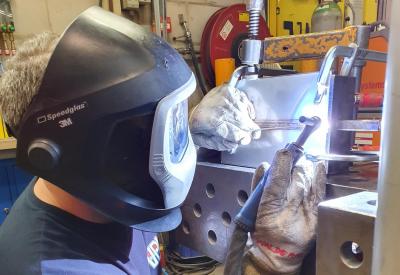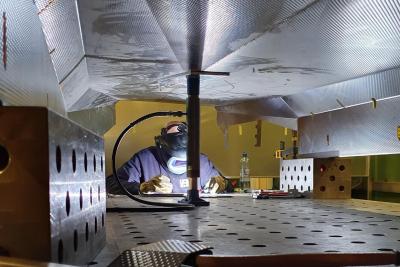VDL Systems continues to invest in craftsmanship of welding experts
In recent years, VDL Systems has not only expanded in its production space and machine park, but also the number employees has further increased. The craftsmen at our welding shop are the beating heart of the production. Therefore, at this department we also continue to invest in craftsmanship. With pride, we can announce that recently 12 of our welding shop employees have graduated for a higher level of TIG-welding. Furthermore, various employees have graduated for their TIG and MAG welding certificates for the US-standards AWS D1.6 and ASME IX (9).
In the light of continuous improvement at VDL Systems, these 12 craftsmen were motivated to follow the evening courses TIG-welding during last year. After 17 courses all participants graduated for their NIL-diploma. Herewith, they literally brought their craftsmanship to a higher level. The practical and theoretical course was instructed at various levels by Weldpoint, in cooperation with our internal welding coordinator. At the 16th of September, the instructors of Weldpoint have officially handed out the diplomas, which are officially certified by NIL (Dutch Welding Institute). This achievem,ent is not only a major progress for our people on personal level, but also an important step forward for VDL Systems as a manufacturing company.
Furthermore, some of our more experienced welding professionals have graduated for their AWS D1.6 practical certificate, the US-standard for stainless steel welding. Also, a group of our welding experts have graduated for their ASME IX (9) practical certificates, for welding pressure piping. In the coming years, VDL Systems will continue to invest in its employees and the quality level of all production departments within the organization. For example, currently we intend to follow up in 2021 by another NIL-course round for stainless steel welding to reach the organization to an even higher quality level.
As a supplier of modules and machines for the global food processing industry, de requirements set for the quality level are evolving. The increasingly stringent standards in the light of hygiene, demands more importance to the quality of welding construction. Consequently in the design phase of food processing machines, sanitary welding joints are preferred over screwed or bolted joints. To conclude, we see a continuous development towards larger and more multifunctional machine designs. This also implies for us that the welding constructions we produce are more complex. By continually investing in the craftsmanship of our employees, we are able to offer the highest quality standards to our customers.



